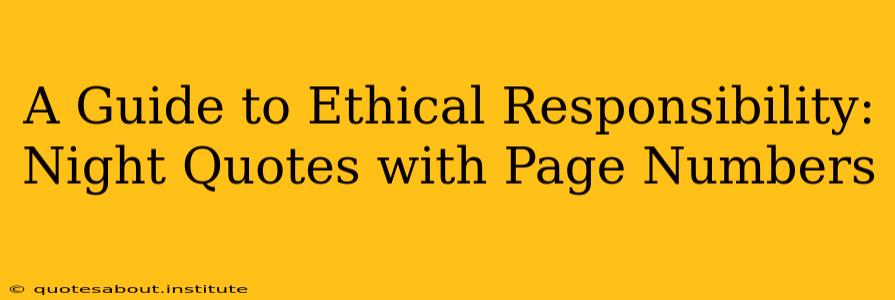Night, Elie Wiesel's harrowing memoir of his experiences in Auschwitz and other Nazi concentration camps, is a powerful testament to the enduring strength of the human spirit amidst unimaginable suffering. Its impact lies not only in its unflinching portrayal of the Holocaust but also in its exploration of profound ethical questions. While the book doesn't explicitly lay out an ethical framework, its pages are rife with implicit lessons about responsibility, both individual and collective. This guide will explore some key quotes from Night, providing page numbers (referencing the Summit Books edition) and analyzing their ethical implications. Please note that page numbers may vary slightly depending on the edition you are using.
Understanding Ethical Responsibility in the Context of Night
Before diving into specific quotes, it's crucial to understand the ethical landscape depicted in Night. Wiesel confronts us with the ultimate ethical dilemma: the complete breakdown of societal norms and the systematic dehumanization of an entire group of people. The Nazis' actions represent a catastrophic failure of ethical responsibility on a grand scale. However, the book also explores the ethical choices – and failures – of individuals within this brutal context. These choices, however small they may seem, highlight the importance of individual moral responsibility even in the face of overwhelming evil.
What are the key ethical questions raised in Night?
This is a critical question that helps frame our understanding of Wiesel's work. The book compels us to consider:
- The responsibility of bystanders: Why did the world stand by and allow the Holocaust to happen? What are the ethical obligations of individuals and nations when faced with atrocities?
- The limits of human endurance: How far can one be pushed before moral principles are compromised? What choices are justifiable in the face of survival?
- The nature of faith and belief: How can faith survive in the face of such profound suffering and the apparent absence of God? What is the ethical responsibility of religious institutions in times of crisis?
- The importance of memory and testimony: What is the ethical obligation to remember and to bear witness to the horrors of the past? How do we ensure that such atrocities are never repeated?
Analyzing Key Quotes and Their Ethical Significance:
Let's delve into some powerful quotes from Night and dissect their ethical implications:
"Never shall I forget that night, the first night in camp, which has turned my life into one long night, seven times cursed and seven times sealed. Never shall I forget the smoke. Never shall I forget the little faces of the children whose bodies were turned into wreaths of smoke beneath a silent blue sky. Never shall I forget those flames that consumed my faith forever. Never shall I forget the nocturnal silence which deprived me, for all eternity, of the desire to live. Never shall I forget those moments which murdered my God and my soul and turned my dreams to dust. Never shall I forget these things, even if I am condemned to live as long as God Himself. Never." (p. 34)
This quote, arguably the most famous from Night, encapsulates the profound trauma and moral outrage Wiesel experienced. Ethically, it speaks to the imperative to remember and to never allow such horrors to be forgotten. It also highlights the shattering of faith – a significant ethical question in the context of the Holocaust.
"From the depths of the mirror, a corpse gazed back at me. The look in his eyes as he stared into my own was one of profound hopelessness." (p. 73)
This powerful image reflects the dehumanization process within the camps. Ethically, it speaks to the consequences of treating human beings as mere objects, devoid of dignity and worth. It underscores the dangers of indifference and the importance of recognizing the inherent humanity in all individuals.
"The first step toward becoming inhuman is to deny someone the right to be human." (p. No specific page number; this is a paraphrased idea consistently presented)
While not a direct quote with a specific page number, this is a central theme throughout the book. It illustrates the ethical process of dehumanization—removing someone’s inherent rights and dignity to justify inhumane acts.
"And then it happened – or rather, it didn't happen: I was selected for the crematorium." (Approximate page number, varies by edition)
This quote illustrates the arbitrariness of life and death in the concentration camps. The ethical implication is the stark realization that one's fate could be determined based on pure chance and the cruelty of those in power, highlighting the fragility of human life and the importance of fighting for justice and equality.
Conclusion:
Night is not simply a historical account; it’s a profound ethical exploration. By examining the quotes and their contexts, we grapple with fundamental questions about human behavior, moral responsibility, and the enduring power of memory. The book serves as a potent reminder of the catastrophic consequences of unchecked evil and the enduring importance of individual ethical action, even in the darkest of times. It demands that we confront our own ethical responsibilities, both personally and collectively, to ensure that the lessons of the Holocaust are never forgotten.

